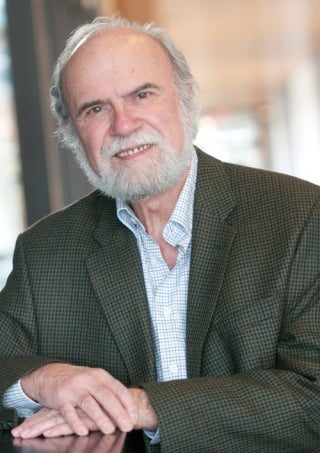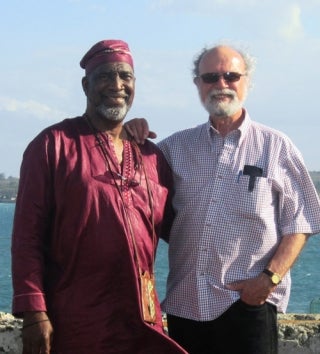Black History Month: The radical life of Rocky Jones
Waterloo history professor is writing a book about the late Rocky Jones, who fought for racial equality in Canada from the 1960s onward
Waterloo history professor is writing a book about the late Rocky Jones, who fought for racial equality in Canada from the 1960s onward
By Wendy Philpott Faculty of ArtsHe was considered a radical and a revolutionary, and for years the RCMP watched him closely. But the life and times of Burnley (Rocky) Jones was mainly about leadership, inspiration and education to redress racial injustice for black communities in Canada and especially Nova Scotia.
Jones’ good friend and colleague, James Walker, a professor in the University of Waterloo’s Department of History, is writing a book about Jones - B.A. Rocky Jones: Revolutionary - to be launched this spring. Walker, a celebrated scholar in the history of human rights and the struggle for racial equity, first met Jones at a civil rights demonstration in Toronto in 1965 and his friendship grew when Walker moved to Halifax to further his studies at Dalhousie University.
“Through Rocky, I became involved with The Movement,” says Walker.

James Walker, professor in the University of Waterloo's Department of History
The career of his friend and colleague was remarkable, says Walker, not only for Jones’ participation in the movement for racial equality from the 1960s onward, but for the resonance of his contributions in many of the institutions promoting human rights and social equality today.
Journalists dubbed him Rocky the Revolutionary and “Canada’s Stokely Carmichael” for his outspoken endorsement of Black Power, the US-based radical movement led by Carmichael and Malcolm X, and for his support for the Black Panthers. “But what was genuinely revolutionary,” says Walker, “was his articulation of a systemic definition of racism, which spurred remedial programs for the historic victims of discrimination.”
“Through Rocky’s life story and involvements, the narrative captures most of the significant moments in Black Nova Scotian history over half a century,” says Walker. Part memoir in Jones’ voice and part history, the book will include an afterword by Canada’s newly appointed poet laureate and Waterloo alumnus, George Elliott Clarke, who will reflect on his childhood hero and mentor.
During the 1960s and ‘70s Jones co-founded the Black United Front of Nova Scotia and the National Black Coalition of Canada.

Rocky Jones and James Walker
He travelled widely as a speaker and fund-raiser on behalf of the Student Non-Violent Coordinating Committee (SNCC.) Jones became a strong and persuasive voice for African Canadians in political protest scenarios as well in more staid settings - for example, as a panelist on Martin Luther King Jr. at the 1967 CBC Massey Lectures, “Conscience for Change.”
Later in his career, Jones earned his LLB and was a high profile human rights and labour lawyer in Halifax. In 1997 he successfully argued the groundbreaking case of R. v. R.D.S. before the Supreme Court of Canada, which set precedent for race-related litigation.
“He was quickly singled out, by the press and by the activists, as a charismatic and informed spokesperson who could convey the conditions of African-descended Canadians in Nova Scotia and elsewhere, and tie them to the situation faced by African Americans,” says Walker.
“Rocky thrived on his reputation for being a radical. And it worked, it got him public attention.” In fact, says Walker, it was his rhetoric that was radical more than anything else. Nonetheless, the RCMP had Jones under surveillance for years. It was said that the biggest problem for the RCMP in the 1970s was ‘Black Nova Scotia and Quebec Separatists’.”
Together, Walker and Jones conceived and founded Dalhousie University’s exemplary Transition Year Program for African-Canadians and First Nations Students – a highly successful program that recently celebrated its 40th anniversary having launched numerous black and indigenous leaders in eastern Canada. The establishment of that program, points out Walker, was actually one of the most radical things Rocky was involved in, particularly as it came before Canada adopted affirmative action policies.
The book is based on a collaboration between Jones, Clarke and Walker, with hours of their recorded conversations and additional research in personal and government archives. But before the vast amount of content could be shaped into a book, Jones died suddenly in July 2013.
In addition to being a great story, Walker, who wrote a book on Nova Scotia’s Black Loyalists, thinks his new book will be instructive to anyone and especially inspiring to young black people today. It will fill a gap in our history - a vital chapter in Canada’s civil rights movement. Lawrence Hill, author of the international bestselling novel, The Book of Negroes, has said he was inspired to write his novel after reading Walker’s book on Nova Scotia’s Black Loyalists.

Read more
A Waterloo couple reflects on the campus that shaped their careers, their values, and their love story

Read more
To meet our AI ambitions, we’ll need to lean upon Canada’s unique strengths

Read more
From optometry and pharmacy to public health and therapeutics, Waterloo alumni are powering Canada’s health care sector
The University of Waterloo acknowledges that much of our work takes place on the traditional territory of the Neutral, Anishinaabeg, and Haudenosaunee peoples. Our main campus is situated on the Haldimand Tract, the land granted to the Six Nations that includes six miles on each side of the Grand River. Our active work toward reconciliation takes place across our campuses through research, learning, teaching, and community building, and is co-ordinated within the Office of Indigenous Relations.